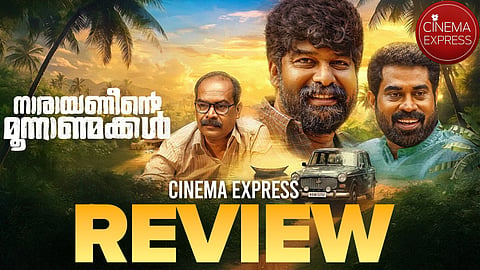Narayaneente Moonnaanmakkal Movie Review: A tender ode to family, love and letting go
Narayaneente Moonnaanmakkal(3.5 / 5)
There’s something inherently compelling about homecoming dramas—tales of fractured relationships, unresolved tensions and reluctant reunions. Debutant filmmaker Sharan Venugopal's Narayaneente Moonnaanmakkal (Three Sons of Narayani) belongs to this evocative tradition, exploring the lives of three estranged brothers—Sethu (Joju George), Bhasker (Suraj Venjaramoodu), and Vishwanathan (Alencier Ley Lopez)—who return to their ancestral home in Koyilandi, Kozhikode as their ailing mother nears death. With a broken past, they arrive carrying baggage heavier than their suitcases. And as the house exhales its history, old resentments crawl out from the corners.
Director: Sharan Venugopal
Cast: Joju George, Suraj Venjaramoodu, Alencier Ley Lopez, Garggi Ananthan, Thomas Mathew, Shelly Nabu, Sajitha Madathil
In terms of its basic setting, Narayaneente Moonnaanmakkal is reminiscent of the MT Vasudevan Nair-IV Sasi classic Aalkkoottathil Thaniye (1984), which also explores the weight of familial estrangement against the backdrop of impending loss. There are also shades of Padmarajan’s Thinkalazhcha Nalla Divasam (1985), particularly in how casteism is subtly addressed in a more inclusive manner without being didactic. Vishwanathan harbours a deep resentment towards a dominant caste that once belittled his father, yet he himself is blinded by his own prejudices against Muslims. The film does not judge him harshly, nor does it excuse him. It simply lays his flaws bare and asks us to sit with them. The subplot involving a gossiping relative (a superb Sarasa Balussery), who mistakenly arrives thinking Narayani has already passed, injects some much-needed dark humour, particularly in a perfectly timed smirk from Joju George.
Joju George, Suraj Venjaramoodu and Alencier portray their characters with remarkable depth. Joju, in particular, delivers a stunning performance, embodying Sethu with quiet wisdom and a touch of mischief. He plays him not as a martyr or a mediator but as a man who has made peace with the impermanence of things. Sethu is often dismissed as a fool by his brothers, but he emerges as the emotional anchor of the story. His pivotal line—"Relationships are ephemeral."—encapsulates the film’s meditative exploration of family ties. Joju’s ability to internalize his character’s emotions without overt dramatisation also makes him the film’s beating heart.
But for all its brooding intensity, the film finds its most tender moments in the next generation with a subplot involving societal taboos. Nikhil (a charming Thomas Mathew), Bhasker’s son, is a socially anxious young filmmaker trying hard to nurse a heartbreak. Aathira (a beautifully restrained Garggi Ananthan), Vishwanathan’s daughter, is a quiet force of warmth and wisdom. In a moment that feels plucked from a Richard Linklater film, she tells him to close his eyes and imagine a butterfly resting on his palm. “You loved having it there, didn’t you?” she asks. “But after a while, it wanted to fly, so you let it go. Maybe it will return, maybe not. But even if it doesn’t, you can always cherish the time you had together.” This, in essence, is the film—a story about love, loss, and the quiet understanding that some things are meant to slip through our fingers. The scene is not just about a lost romance—it is about every relationship in the film, every fleeting moment of connection that these characters have learned to either embrace or resent.
Narayaneente Moonnaanmakkal also offers multiple perspectives on familial discord. Bhasker, exiled from his family for marrying a Muslim woman, Nafeesa (an effective Shelly Nabu), now finds himself in a quandary over his inheritance. Having once renounced his share, he now seeks to reclaim it, igniting tensions with Vishwanathan. The first half is masterfully crafted, effortlessly setting up these layered conflicts. The latter half, while slightly meandering, still manages to maintain its emotional weight. You can see where the story is heading, yet the journey remains engaging.
While the film may feel like it lingers too long in its own shadows with its deliberate pacing that requires patience to be rewarded, its technical mastery keeps it compelling enough. Jayadevan Chakkadath’s sound design plays with silences as much as with sound, letting the weight of unspoken words settle in the air. Rahul Raj’s music doesn’t force emotions—it merely underscores them, allowing the film’s warmth to emerge naturally. Appu Prabhakar’s cinematography, too, deserves special mention. The visual warmth of Koyilandi’s rural landscape lends itself to the film’s nostalgic tone. His use of fluid camera movements, particularly in capturing the growing intimacy between Nikhil and Athira, adds a poetic quality to their relationship. The intercutting of conversations—such as the parallel discussions between Nikhil and Athira about sibling age gaps, juxtaposed with a kitchen exchange between Nafeesa and Jayasree (an excellent Sajitha Madathil)—demonstrates a meticulous directorial vision.
Ultimately, Narayaneente Moonnaanmakkal is a film that stays with you—like the scent of old books, like the sound of rain hitting an ancestral tiled roof. It wanders at times and stretches itself thin in places, but in the end, it lingers—just like that butterfly Aathira spoke of. And sometimes, that’s enough.

